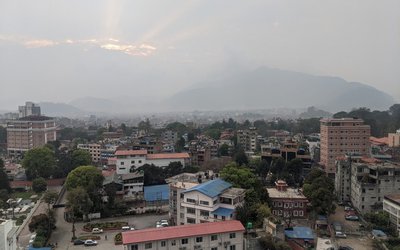Getting away from the dull, cold and depressing month of November in Europe, the typical Westerner – not particularly cultivated, or completely uneducated – sets foot in Nepal with a vague idea of what to expect. The first detail catching his inexperienced eye is the ornament of the Kathmandu airport arrival lounge. Fine woodworks, dark are yet more welcoming than the hospital-like look of many western airports. A first signal of a society definitely less sterilized than his own.
Once outside, the very first breath of Nepali air is outshined by the sight: dozens of Nepali – mostly males - facing the exit door of the airport, are shouting names, waving signs and examining every single traveler coming out and looking disoriented. They are like a disorderly guard of honour greeting the newcomer as he arrives in this parallel universe. A world so different that the foreigner cannot but struggle to realize that this place and the one he comes from actually co-exist on the same planet. A few-hour flight is enough to turn one’s mind upside down and throw them on a land where the rules and customs they regarded as being obvious just do not apply, and are replaced by others.
Inevitably, the Westerner is bound to interpret what he sees, hears or smells through the particular filter of his own culture. Thus, the monkeys walking by the road between the airport and the city makes him think something like: “Oh, how exotic!”. As for the gaping holes in the pavement: “Surely, that would make the safety experts of my country go crazy!”, considers the naive onlooker, who also finds the absence of traffic lights astonishing. No red lights in Kathmandu, but police officers, standing in the middle of most intersections and waving their arms. This might explain why the first rides – whether in a cab or in a public bus – feel like a journey rife with difficulties. Hopefully, the experienced drivers almost always manage to dodge the vehicles getting a little too close, making the occupant go through quite a fright. The same kind of fear he gets each time he has to cross a road.
Yet, out of this joyful mess, in the sonorous procession of horns and pneumatic drills, the voices of the people are raising. Chatting, gossiping or bargaining. They own the public area. The sounds of Nepali life are emphasized by the colourful outfits and front windows of the shops. Pink, turquoise, or green saris, multicolored buses, and fruits piled up by the sidewalk : little things creating a never-ending festival-like atmosphere. Not to mention the numerous architectural and cultural treasures, such as the stupas, sometimes hidden in discreet backyards.
Although its culture is widely different, this country in the making is not completely impervious to the globalizing mass movement coming from the West. The eye easily caught by what is familiar, the tourist thus notices the many Coca-cola ads displayed in the streets. He also notes that the contemporary trend of the selfie has hit Nepal, creating a bizarre combination of tradition and modernity : for instance, one may witness a group of teenagers taking pictures of themselves with a mobile phone while hanging out next to a stunning stupa.
Entering a Nepali house, finally, the Western intruder is struck by the kindness and smiles of its residents. A warm welcome who will make anyone forget that hot showers are scarce, but that Dhal Bhat meals are not. Unlike what most Europeans or American people have come to think, material comfort is not everything in life. Writing these lines, struggling not to sound condescending towards a country one barely knows, the observer must not bury their head in the sand though : acknowledging the poverty in Nepal is crucial. Only this can draw attention of the international community.
Elise is an intern from France

Elise Godeau
Elise is an intern from France
- The preservation of the Nepali heritage
- Nov 22, 2014
- Discovering Nepal: First impressions of a Westerner
- Nov 08, 2014
















